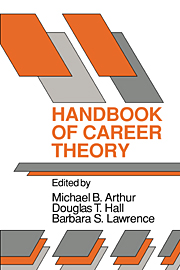Book contents
- Frontmatter
- Contents
- List of contributors
- Preface
- PART I CURRENT APPROACHES TO THE STUDY OF CAREERS
- PART II NEW IDEAS FOR THE STUDY OF CAREERS
- Introduction to Part II
- 11 People as sculptors versus sculpture: the roles of personality and personal control in organizations
- 12 Work, stress, and careers: a preventive approach to maintaining organizational health
- 13 Re-visioning career concepts: a feminist invitation
- 14 Reciprocity at work: the separate, yet inseparable possibilities for individual and organizational development
- 15 Career improvisation in self-designing organizations
- 16 Organization career systems and employee misperceptions
- 17 Blue-collar careers: meaning and choice in a world of constraints
- 18 A political perspective on careers: interests, networks, and environments
- 19 Rites of passage in work careers
- 20 Pin stripes, power ties, and personal relationships: the economics of career strategy
- 21 Rhetoric in bureaucratic careers: managing the meaning of management success
- 22 The internal and external career: a theoretical and cross-cultural perspective
- PART III FUTURE DIRECTIONS FOR THE DEVELOPMENT OF CAREER THEORY
- Name index
- Subject index
21 - Rhetoric in bureaucratic careers: managing the meaning of management success
Published online by Cambridge University Press: 05 June 2012
- Frontmatter
- Contents
- List of contributors
- Preface
- PART I CURRENT APPROACHES TO THE STUDY OF CAREERS
- PART II NEW IDEAS FOR THE STUDY OF CAREERS
- Introduction to Part II
- 11 People as sculptors versus sculpture: the roles of personality and personal control in organizations
- 12 Work, stress, and careers: a preventive approach to maintaining organizational health
- 13 Re-visioning career concepts: a feminist invitation
- 14 Reciprocity at work: the separate, yet inseparable possibilities for individual and organizational development
- 15 Career improvisation in self-designing organizations
- 16 Organization career systems and employee misperceptions
- 17 Blue-collar careers: meaning and choice in a world of constraints
- 18 A political perspective on careers: interests, networks, and environments
- 19 Rites of passage in work careers
- 20 Pin stripes, power ties, and personal relationships: the economics of career strategy
- 21 Rhetoric in bureaucratic careers: managing the meaning of management success
- 22 The internal and external career: a theoretical and cross-cultural perspective
- PART III FUTURE DIRECTIONS FOR THE DEVELOPMENT OF CAREER THEORY
- Name index
- Subject index
Summary
In career research, we have often operated as if there were some specific content of human action, an already objectivized world; but, in fact, there is not.
A. Collin and R. A. Young, 1986INTRODUCTION
The point of departure for this chapter is provided by Weigert (1983:316), who, when discussing biographies and careers, comments that
to make sense, a biography must be sustained by a social structure that renders the story plausible (Berger 1967; McLain and Weigert 1979). Storytellers are important sustainers of the social structures that provide a meaningful context for the grunts and groans of life. In a bureaucratically organized society, the structures accept individuals as holders of prearranged careers. The faded pictures behind the idea “career” are of a wagon on a path or a runner on a racetrack. The commonsense notion of a career restricts it to highly visible occupations such as law, medicine, politics, or sports. In a bureaucratically organized society, however, the term career is appropriately applied to all members.
Our choice of these comments has been influenced by their direct reference to the construction of meaning in social contexts, which clearly reflects an emerging stance toward the study of careers (Arthur and Lawrence 1984; Collin and Young 1986; Van Maanen 1977). However, as indicated by the opening quotation, we find it fruitful to modify the suggestion that a given social structure in some way determines the form and meaning of careers. Instead, we argue that the rhetorical construction of careers is not only determined by our social environments, but also creates and legitimates them.
- Type
- Chapter
- Information
- Handbook of Career Theory , pp. 437 - 453Publisher: Cambridge University PressPrint publication year: 1989
- 33
- Cited by

